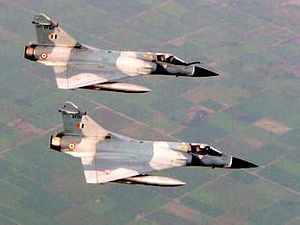Early on Tuesday morning, Indian Air Force (IAF) Mirage 2000 fighters reportedly struck a terror training camp in Balakot, in Pakistan’s Khyber Pakhtunkhwa Province. The IAF strikes were in retaliation for a February 14 attack, which was claimed by Pakistan-based terror group Jaish-e-Mohammed (JeM). JeM has claimed other attacks on India, including the 2016 Pathankot attack and the 2001 attack on the Indian parliament.
The strikes mark the first use of airpower by India against Pakistani territory since the two countries fought a war in 1971. It is the first known use of conventional air power by one state with nuclear weapons against the territory of another. While India and Pakistan fought a war in 1999 after both having broken out as nuclear weapons, the Indian Air Force did not strike at targets across the Line of Control, the demarcation line that separates parts of the disputed Kashmir region that each country administers.
“Credible intelligence was received that JeM was attempting another suicide terror attack in various parts of the country, and the fidayeen jihadis were being trained for this purpose,” Indian Foreign Secretary Vijay Gokhale said at a briefing on Tuesday. “In the face of imminent danger, a preemptive strike became absolutely necessary.
“This facility in Balakot was headed by Maulana Yusuf Azhar alias Ustad Ghauri, brother in law of JeM Chief Masood Azhar,” he continued. “The selection of the target was also conditioned by our desire to avoid civilian casualty. It’s located in deep forest on a hilltop,” he added. Gokhale underlined that the action was not directed at the Pakistani military and described it as a “non-military preemptive action.”
Earlier in the morning, shortly after the Indian strikes, Maj. Gen. Asif Ghafoor, the director-general of Pakistan’s Inter-Services Public Relations, the military’s public relations arm, said that the Indian aircraft had not hit any targets of significance. Ghafoor noted, however, that “Indian Air Force violated [the] Line of Control” and that after a scramble by Pakistan Air Force fighters, the Indian jets went back. No Indian aircraft were intercepted or struck by Pakistani air defenses, it appears.
In a separate tweet, Ghafoor noted that the “payload of hastily escaping Indian aircrafts fell in open.” The Pakistani side published four images of what appeared to be damage to an unpopulated area from what it claimed was the “payload” of the Indian fighters. Ghafoor noted that the IAF fighters “intruded from Muzafarabad sector.” He underlined that “no casualties or damage” resulted from the attack.
The divergent Indian and Pakistani positions in the aftermath of Tuesday’s strikes is reminiscent of statements released by both sides after India’s decision in September 2016 — after the killing of Indian troops by Pakistan-based militants — to conduct what it called “surgical strikes” against Pakistan-administered Kashmir-based “launch pads.” Pakistan at the time claimed no Indian incursion had occurred.
Indian public messaging around Tuesday’s strikes has some notable differences from the 2016 surgical strikes. First of all, Gokhale, the country’s top professional diplomat, delivered a briefing with no military officers present. The 2016 surgical strikes briefing was delivered by India’s Director General of Military Operations.
Many details surrounding Tuesday’s attack remain unclear at this point, including the precise munitions that were used and the extent to which Indian Air Force fighters crossed the Line of Control to strike at Balakot. Secondary reports citing unnamed official Indian sources have noted that targets outside of the camp at Balakot were targeted too.
On February 14, more than 40 Indian paramilitary personnel were killed by a vehicle-borne improvised explosive device driven by a lone attacker. The attack was claimed by JeM, prompting India to undertake a diplomatic campaign to isolate Pakistan and enact a range of other sanctions, including withdrawing Pakistan’s Most-Favored Nation status. The Pulwama attack was the deadliest against Indian security personnel in Kashmir in 30 years.

































